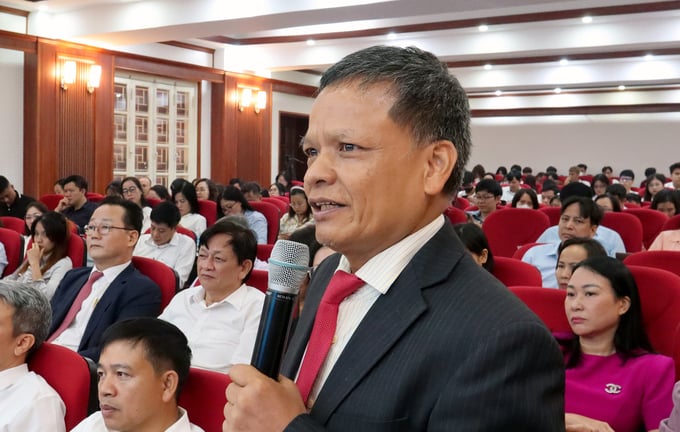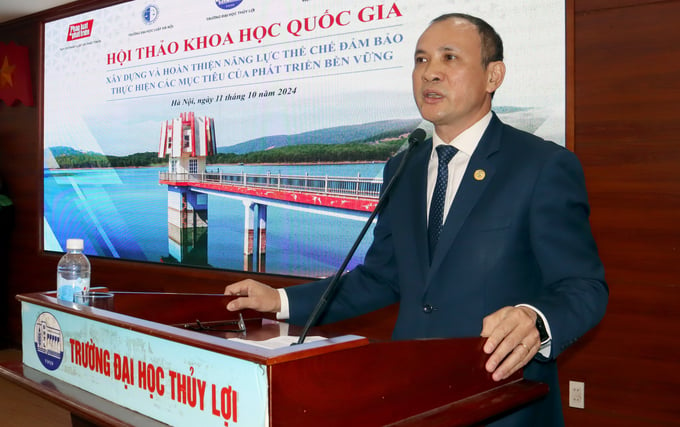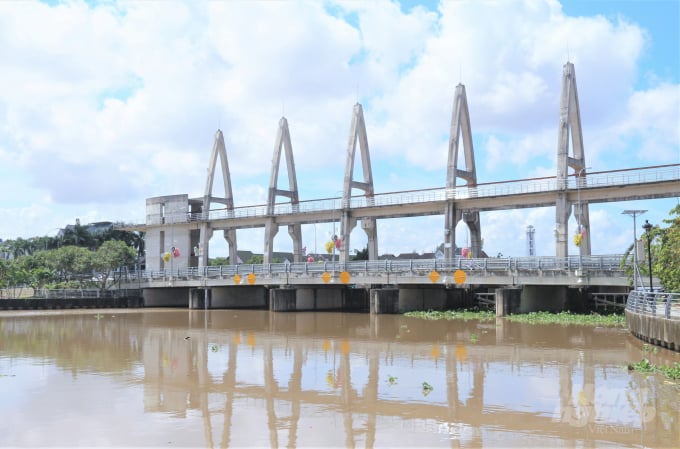November 27, 2025 | 15:31 GMT +7
November 27, 2025 | 15:31 GMT +7
Hotline: 0913.378.918
November 27, 2025 | 15:31 GMT +7
Hotline: 0913.378.918

Prof. Dr. Nguyen Hong Thao presenting his opinions on water resources on the Mekong River. Photo: TLU.
One of the key goals of sustainable development is maintaining water security. This issue has gradually gradually developed into a global responsibility, according to Nguyen Hong Thao, Vice Chair of the United Nations International Law Commission and an expert in the Faculty of Law and Political Theory at Thuy Loi University.
Prof. Dr. Thao cited the case of the Funan Canal, a project on the management, use, and sustainable development of transboundary water resources in the Mekong Subregion, during his speech. He explained that Cambodia views the project as an opportunity for infrastructure development, with the aim of guiding the economy and fostering new growth dynamics.
However, due to the Mekong River's transboundary nature, its significant geographical importance, and considerable potential for economic development, the implementation of projects, including the Funan Canal, calls for a multifaceted approach to effectively achieving sustainable development goals. Notably, the increasingly severe impacts of climate change place a stronger emphasis on this requirement.
"Sustainable management of transboundary water resources such as the Mekong River will enable riparian countries to improve governance, adopt a more proactive approach to food and energy production, and contribute effectively to economic growth, thereby enhancing the quality of life for their citizens," added Prof. Dr. Nguyen Hong Thao.
Prof. Dr. Thao also recommended that Vietnam assume a proactive role in building and developing regional/subregional cooperation mechanisms related to the Mekong River, in addition to rallying support from other involved nations.
Additionally, he suggested drawing on the water management experiences of countries in the Nile, Danube, and Rhine river basins. "By complying with international environmental principles, we can create the most optimal foundation for Mekong Subregion countries to develop for the benefit of future generations," Prof. Dr. Thao emphasized.

Prof. Dr. Nguyen Trung Viet, Vice Rector of Thuy Loi University, giving a speech at the seminar. Photo: TLU.
Nguyen Hong Khanh, Deputy Director of the Department of Water Resources, expressed agreement with Prof. Dr. Thao's views. According to Deputy Director Khanh, the protection of water resources is a critical issue for every country. During the implementation of the Funan Canal project, the Ministry of Agriculture and Rural Development has developed several scenarios to ensure a fresh water supply for downstream communities.
In addition to coordinating closely with the Ministry of Natural Resources and Environment, the Ministry of Agriculture and Rural Development has instructed local governments in the Mekong Delta region to implement the Politburo's Conclusion No. 36 on water security and dam and reservoir safety.
Furthermore, the Ministry of Agriculture and Rural Development is expediting the development of the Mekong River Basin Irrigation Plan following the Disaster Prevention and Irrigation Master Plan for the years between 2021 and 2030, with a vision towards 2050.
"We are committed to gathering comprehensive data for detailed assessments of the impacts, thereby proposing both short-term and long-term solutions," Deputy Director Khanh reported, adding that insights shared at the October 11 seminar will help regulatory agencies and policymakers improve the existing legal framework.
The national seminar titled “Building and Improving Institutional Capacity to Implement Sustainable Development Goals” is part of a series of events celebrating the 65th anniversary of Thuy Loi University's founding. The event also coincides with the water resources sector's preparation for its 80th anniversary.
The Journal of Law and Development, Thuy Loi University, Hanoi Law University, the Institute of State and Law, and Sen Vang Company, co-hosted the seminar with four key topics:
- Perspectives, policies, and guidelines on the environment for sustainable development goals
- Improving water resource protection laws for sustainable development
- Enhancing environmental pollution control laws for sustainable development
- Strengthening the legal framework for labor markets and social welfare towards sustainable development.

Water security is a vital task for achieving sustainable development. Photo: Pham Hieu.
Prof. Dr. Le Hong Hanh, Editor-in-Chief of the Journal of Law and Development and Chairman of the Vietnam International Arbitration Center, remarked that the seminar provides a platform for experts, scientists, managers, and lecturers to exchange and discuss policy frameworks regarding the three pillars of sustainable development: economic growth, environmental protection, and social welfare.
In addition, the event aims to strengthen the connection between research, teaching, and state management while identifying the limitations and challenges in the current institutional framework for sustainable development. Subsequently, stakeholders can identify collaborative research and detailed solutions to improve institutional capacity with the aim of meeting the country's sustainable development goals.
Key topics discussed on October 11 included: improving water resource protection laws, enhancing environmental pollution control, and strengthening the legal framework for labor markets and social welfare towards sustainable development.
As sustainable development rapidly becomes a central goal for all countries across the globe, Prof. Dr. Nguyen Trung Viet emphasized the importance of enhancing institutional capacity to promote effective implementation.
"For Vietnam, matching legal policies with the realities of economic growth, environmental protection, and social welfare is the foundation for achieving sustainable development," Prof. Dr. Viet noted.
Translated by Nguyen Hai Long
/2025/11/26/4909-2-154329_878.jpg)
(VAN) Pearl grouper farming in HDPE cages not only delivers economic efficiency but also contributes to protecting the environment, creating jobs, and promoting marine-based experiential tourism.

(VAN) The model of making a living under the forest canopy through the agroforestry system in Van Son commune, Bac Ninh province, is expected to generate an annual income of approximately VND 30 million/ha.

(VAN) Many enterprises in Can Tho are harnessing natural energy and reducing greenhouse gas emissions in their production processes, thereby contributing to the promotion of a sustainable green transition.
/2025/11/24/3536-2-112800_176.jpg)
(VAN) Dong Nai now has tens of thousands of hectares of forests certified for sustainable management, and this area will continue to be expanded in the coming period.

(VAN) Vinh Ha hamlet (Dai Xuyen commune, Hanoi) is shifting away from small-scale farming as households adopt bioscurity into their breeder chicken models.

(VAN) Heavy rains make aquatic species more vulnerable to disease. Proactive water management and high-tech systems help farmers prevent outbreaks and protect yields.

(VAN) Greenhouses are shifting production mindsets in Binh Lu commune, enabling farmers to ‘weather the sun and rain’ and secure stable vegetable harvests throughout the year.